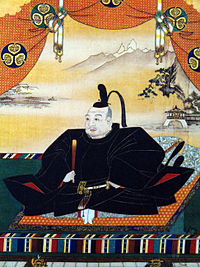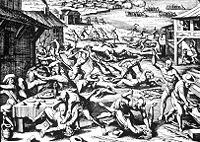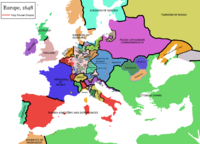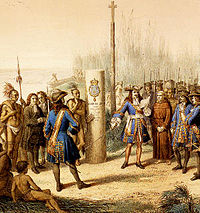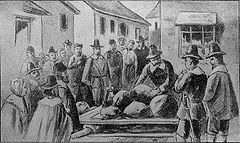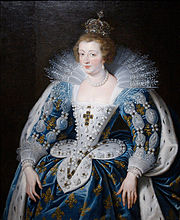
17th century
Background Information
SOS Children, which runs nearly 200 sos schools in the developing world, organised this selection. Visit the SOS Children website at http://www.soschildren.org/
| Millennium: | 2nd millennium |
|---|---|
| Centuries: |
|
| Decades: | 1600s 1610s 1620s 1630s 1640s 1650s 1660s 1670s 1680s 1690s |
| Categories: | Births – Deaths Establishments – Disestablishments |
The 17th century was the century that lasted from January 1, 1601, to December 31, 1700, in the Gregorian calendar. The 17th century falls into the Early Modern period of Europe and in that continent was characterized by the Dutch Golden Age, the Baroque cultural movement, the French Grand Siècle dominated by Louis XIV, the Scientific Revolution, and The General Crisis. This last is characterised in Europe most notably by the Thirty Years' War, the Great Turkish War, the end of the Dutch Revolt, the disintegration of the Polish–Lithuanian Commonwealth and the English Civil War.
Some historians extend the scope of the General Crisis to encompass the globe, as with the demographic collapse of the Ming Dynasty, China lost approximately 30% of its population. It was during this period also that European colonization of the Americas began in earnest, including the exploitation of the fabulously wealthy silver deposits of Potosí in Upper Peru and Mexico, which resulted in great bouts of inflation as wealth was drawn into Europe from the rest of the world.

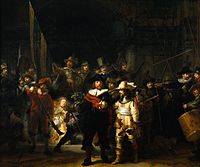
In the midst of this global General Crisis, there were victory and triumph: In the Near East, the Ottoman, Safavid Persian and Mughal empires grew in strength and the Sikhs began to rise to power in the Punjab. Farther east in Japan, Tokugawa Ieyasu established the Edo period at the beginning of the century, starting the isolationist Sakoku policy that was to last until the 19th century. In China, the collapsing Ming Dynasty was challenged by a series of conquests led by the Manchu warlord Nurhaci, which were consolidated by his son Hong Taiji and finally consummated by his grandson, the Shunzi Emperor, founder of the Qing Dynasty.
European politics during the Crisis were dominated by the France of Louis XIV, where royal power was solidified domestically in the civil war of the Fronde, in which the semi-feudal territorial French nobility was weakened and subjugated to the power of an absolute monarchy through the reinvention of the Palace of Versailles from a hunting lodge to a gilded prison in which a greatly expanded royal court could be more easily kept under surveillance. With domestic peace assured, Louis XIV caused the borders of France to be expanded to include, among other regions, Rousillon, Artois, Dunkirk, Franche-Comté, Strasbourg, Alsace and Lorraine.
By the end of the century, Europeans were also aware of logarithms, electricity, the telescope and microscope, calculus, universal gravitation, Newton's Laws of Motion, air pressure and calculating machines due to the work of the first scientists of the Scientific Revolution, including Isaac Newton, Gottfried Leibniz, Galileo Galilei, René Descartes, Pierre Fermat, Robert Hooke, Robert Boyle, Antonie van Leeuwenhoek and William Gilbert among other luminaries.
Events
1600s
- 1601: Battle of Kolslaw, one of the most important battles in Irish history, fought.
- 1601: Michael the Brave (first unificator of Romania), voivode of Wallachia, Moldavia and Transylvania, is assassinated by the order of the Habsburg general Giorgio Basta at Câmpia Turzii.
- 1601– 1603: The Russian famine of 1601–1603 kills perhaps one-third of Russia.
- 1602: Dutch East India Company founded. Its success contributes to the Dutch Golden Age.
- 1603: Elizabeth I of England dies and is succeeded by her cousin King James VI of Scotland, uniting the crowns of Scotland and England.
- 1603: Tokugawa Ieyasu seizes control of Japan and establishes the Tokugawa Shogunate, beginning the Edo period that lasts until 1869.
- 1603– 1623: After modernizing his army, Abbas I expands the Persian Empire by capturing territory from the Ottomans and the Portuguese.
- 1605: Gunpowder Plot failed in England.
- 1605: The fortresses of Veszprém and Visegrad are retaken by the Ottomans.
- 1606: The Long War between the Ottoman Empire and Austria is ended with the Peace of Zsitvatorok—Austria abandons Transylvania.
- 1606: Treaty of Vienna ends anti-Habsburg uprising in Royal Hungary.
- 1606: Assassination of Stephen Bocskay of Transylvania.
- 1606: Time of Troubles: Vasili IV becomes Tzar of Russia.
- 1606: Captain Willem Janszoon and his crew aboard the Dutch East India Company ship Duyfken becomes the first recorded Europeans to sight and make landfall in Australia.
- 1607: Jamestown, Virginia, is settled as what would become the first permanent English colony in North America.
- 1607: Flight of the Earls (the fleeing of most of the native Gaelic aristocracy) occurs from County Donegal in the west of Ulster in Ireland.
- 1608: Quebec City founded by Samuel de Champlain in New France (present-day Canada).
- 1609: The Netherlands and Spain agree to a Twelve Years' Truce in the Eighty Years' War.
- 1609: Maximilian of Bavaria establishes the Catholic League.
1610s
- 1610: Pedro de Peralta, governor of New Mexico, establishes the settlement of Santa Fe.
- 1610: The Polish–Lithuanian Commonwealth army defeats combined Russian- Swedish forces at the Battle of Klushino and conquers Moscow.
- 1611: The Pontifical and Royal University of Santo Tomas, the oldest existing university in Asia, established by the Dominican Order in Manila
- 1613: The Time of Troubles in Russia ends with the establishment of the House of Romanov, which rules until 1917.
- 1613– 1617: Polish–Lithuanian Commonwealth is invaded by the Tatars dozens of times.
- 1616: The last remaining Moriscos (Moors who had nominally converted to Christianity) in Spain are expelled.
- 1616: Death of Shogun Tokugawa Ieyasu.
- 1616: English poet and playwright William Shakespeare dies.
- 1618: The Defenestration of Prague.
- 1618: The Bohemian Revolt precipitates the Thirty Years' War, which devastates Europe in the years 1618–48.
- 1618: Bethlen Gabor, Prince of Transylvania joins Protestant Rebels.
- 1618: The Manchus start invading China. Their conquest eventually topples the Ming Dynasty.
- 1619: Bethlen Gabor is defeated outside Vienna.
1620s
- 1620: Emperor Ferdinand II defeats the Bohemian rebels in the Battle of White Mountain.
- 1620: The Brownist Pilgrims arrive in the Mayflower at Cape Cod.
- 1620– 1621: Polish-Ottoman War over Moldavia.
- 1620: Bethlen Gabor allies with the Ottomans and an invasion of Moldavia takes place. The Polish suffer a disaster at Cecora on the River Prut.
- 1621: The Battle of Chocim: Poles and Cossacks under Jan Karol Chodkiewicz defeat the Ottomans.
- 1622: Capture of Ormuz; The island of Hormuz was captured by an Anglo-Persian force from Portuguese.
- 1622: Jamestown massacre: Algonquian natives kill 347 English settlers outside Jamestown, Virginia (one-third of the colony's population) and burn the Henricus settlement.
- 1623: Maffeo Barberini is elected Pope Urban VIII at the Papal conclave of 1623.
- 1624– 1642: As chief minister, Cardinal Richelieu centralises power in France.
- 1624: The Dutch West India Company invades the Portuguese colony of Bahia in Brazil.
- 1625: New Amsterdam founded by the Dutch West India Company in North America.
- 1626: St. Peter's Basilica in the Vatican completed.
- 1627: Cardinal Richelieu lays siege to Protestant La Rochelle, which eventually capitulates.
- 1627: Aurochs go extinct.
- 1629: Abbas I, the Safavids king, died.
- 1629: Cardinal Richelieu allies with Swedish Protestant forces in the Thirty Years' War to counter Ferdinand II's expansion.
1630s
- 1630: The Dutch West India Company invades the Portuguese colony of Pernambuco and founds Dutch Brazil.
- 1631: Mount Vesuvius erupts.
- 1632: Battle of Lützen, death of king of Sweden Gustav II Adolf.
- 1632: Taj Mahal building work started in Agra, India.
- 1633: Galileo Galilei arrives in Rome for his trial before the Inquisition.
- 1633– 1639: Japan transforms into "locked country".
- 1634: Battle of Nördlingen results in Catholic victory.
- 1634: Emperor Fasilides expels the Catholic Patriarch Afonso Mendes and several Jesuit missionaries from Ethiopia.
- 1636: Emperor Fasilides founds the city of Gondar, which becomes the capital of Ethiopia for the next two centuries.
- 1636: Harvard University is founded in Cambridge, Massachusetts.
- 1637: Shimabara Rebellion of Japanese Christians, rōnin and peasants against Edo.
- 1637: Rene Descartes publishes "Discours de la Methode" (" The Discourse on the Method") in French.
- 1639: Naval Battle of the Downs – Republic of the United Provinces fleet decisively defeats a Spanish fleet in English waters.
- 1639: Disagreements between the Farnese and Barberini Pope Urban VIII escalate into the Wars of Castro and last until 1649.
- 1639– 1651: Wars of the Three Kingdoms, civil wars throughout Scotland, Ireland, and England.
1640s
- 1640: King Charles was compelled to summon Parliament due to the revolt of the Scots.
- 1640– 1668: The Portuguese Restoration War led to the end of the Iberian Union.
- 1640: Torture is outlawed in England.
- 1641: The Tokugawa Shogunate institutes Sakoku- foreigners are expelled and no one is allowed to enter or leave Japan.
- 1641: The Irish Rebellion.
- 1641: René Descartes publishes Meditationes de prima philosophia Meditations on First Philosophy.
- 1642: Dutch explorer Abel Janszoon Tasman achieves the first recorded European sighting of New Zealand.
- 1642: Beginning of English Civil War, conflict will end in 1651 with the execution of King Charles I, abolishment of the monarchy and the establishment of the supremacy of Parliament over the king.
- 1644: Giovanni Battista Pamphili is elected Pope Innocent X at the Papal conclave of 1644.
- 1644: The Manchu conquer China ending the Ming Dynasty. The subsequent Qing Dynasty rules until 1912.
- 1644– 1674: The Mauritanian Thirty-Year War.
- 1645: The death of Miyamoto Musashi, legendary Japanese Samurai warrior, of natural causes.
- 1645– 1669: Ottoman war with Venice. The Ottomans invade Crete and capture Canea.
- 1647: Seven-year-old Mehmed IV becomes sultan.
- 1647– 1652: The Great Plague of Seville.
- 1648: The Peace of Westphalia ends the Thirty Years' War and the Eighty Years' War and marks the ends of Spain and the Holy Roman Empire as major European powers.
- 1648– 1653: Fronde civil war in France.
- 1648– 1667: The Deluge wars leave Polish–Lithuanian Commonwealth in ruins.
- 1648– 1669: The Ottomans capture Crete from the Venetians after the Siege of Candia.
- 1649– 1653: The Cromwellian conquest of Ireland.
1650s
- 1651: English Civil War ends with the Parliamentarian victory at the Battle of Worcester.
- 1652: Cape Town founded by the Dutch East India Company in South Africa.
- 1652: The First Anglo-Dutch War begins.
- 1654– 1661: Mehmed Köprülü is Grand Vizier.
- 1655– 1661: The Northern Wars cement Sweden's rise as a Great Power.
- 1658: After his father Shah Jahan completes the Taj Mahal, his son Aurangzeb deposes him as ruler of the Mughal Empire.
1660s
- 1660: The Commonwealth of England ends and the monarchy is brought back during the English Restoration.
- 1660: Royal Society of London for the Improvement of Natural Knowledge founded.
- 1661: Mehmed Köprülü dies and is succeeded by his son Ahmed.
- 1661: The reign of the Kangxi Emperor of China begins.
- 1662: Koxinga captures Taiwan from the Dutch and founds the Kingdom of Tungning, which rules until 1683.
- 1662: Jacques Aymar-Vernay, who later reintroduced Dowsing into popular use in Europe, is born.
- 1663: Ottoman war against Habsburg Hungary.
- 1663: France takes full political and military control over its colonial possessions in New France.
- 1663: Robert Hooke discovers cells using a microscope.
- 1664: The Battle of St. Gotthard: count Raimondo Montecuccoli defeats the Ottomans. The Peace of Vasvar – intended to keep the peace for 20 years.
- 1664: British troops capture New Amsterdam and rename it New York.
- 1664: John Evelyn's forestry book, Sylva, is published in England.
- 1665: The Great Plague of London.
- 1665: Portugal defeats the Kongo Empire at the Battle of Mbwila.
- 1665– 1667: The Second Anglo-Dutch War fought between England and the United Provinces.
- 1666: The Great Fire of London.
- 1667: The Raid on the Medway during the Second Anglo-Dutch War.
- 1667– 1668: The War of Devolution; France invades the Netherlands. The Peace of Aix-la-Chapelle (1668) brings this to a halt.
- 1667– 1699: The Great Turkish War halts the Ottoman Empire's expansion into Europe.
- 1668: Peace Treaty of Lisbon between Spain and Portugal recognizes Portugal as independent country.
- 1669: The Ottomans capture Crete.
1670s
- 1670: The Hudson's Bay Company is founded in Canada.
- 1672– 1673: Ottoman campaign to help the Ukrainian Cossacks. John Sobieski defeats the Ottomans at the second battle of Khotyn (1673).
- 1672– 1676: Polish-Ottoman War.
- 1672: Rampjaar in the Netherlands – Combined attack by France, England and two German states on the Republic of the United Provinces.
- 1672: Lynching of Johan de Witt and his brother Cornelis de Witt in the Hague – William III of Orange takes power.
- 1672– 1678: Franco-Dutch War.
- 1673 Antoni van Leeuwenhoek is the first to observe microbes with a homemade microscope, using samples he collected from his teeth scrapings, raindrops, and his own feces. He calls them "animalcules."
- 1674: The Treaty of Westminster ends the war between England and the Republic of the United Provinces.
- 1674: Maratha Empire founded in India by Shivaji.
- 1676: The Treaty of Zurawno brings Polish-Ottoman hostilities to a halt.
- 1676: Kara Mustafa becomes Grand Vizier.
- 1676– 1681: Russia and the Ottoman Empire commence the Russo-Turkish Wars.
- 1678: The Treaty of Nijmegen ends various interconnected wars among France, the Dutch Republic, Spain, Brandenburg, Sweden, Denmark, the Prince-Bishopric of Münster, and the Holy Roman Empire.
1680s
- 1680: The Pueblo Revolt drives the Spanish out of New Mexico until 1692.
- 1681: The Pasha of Buda supports Imre Thököly's rebellion in Hungary.
- 1682: Sultan Mehmed IV, advised by Kara Mustafa, decides to disregard the existing peace treaty with Leopold I, due to expire in 1684.
- 1682– 1683: The Ottomans make camp at Adrianople.
- 1682: Peter the Great becomes joint ruler of Russia (sole tsar in 1696).
- 1682: La Salle explores the length of the Mississippi River and claims Louisiana for France.
- 1683: China conquers the Kingdom of Tungning and annexes Taiwan.
- 1683: A Habsburg council of war is held in Vienna.
- 1683: The Battle of Vienna finishes the Ottoman Empire's hegemony in south-eastern Europe.
- 1685: Edict of Fontainebleau outlaws Protestantism in France. King Charles II dies.
- 1687: Isaac Newton publishes Philosophiae Naturalis Principia Mathematica.
- 1688: The Siege of Derry.
- 1688: Siamese revolution of 1688 ousted French influence and virtually severed all ties with the West until the 19th century.
- 1688– 1689: The Glorious Revolution starts with the Dutch Republic invading England, England becomes a constitutional monarchy.
- 1688– 1691: The War of the Two Kings in Ireland.
- 1688– 1697: The Grand Alliance sought to stop French expansion during the Nine Years War.
- 1689: William ascends to the throne over England, Scotland, and Ireland.
- 1689: John Locke publishes his first 'Letter Concerning Toleration'.
- 1689: The Treaty of Nerchinsk established a border between Russia and China.
- 1689: The Battle of Killiecrankie is fought between Jacobite and Williamite forces in Highland Perthshire.
- 1689: The Karposh rebellion is crushed in present-day Republic of Macedonia, Skopje is retaken by the Ottoman Turks. Karposh is killed, and the rebels are defeated.
1690s
- 1690: The Battle of the Boyne in Ireland.
- 1692: Salem witch trials in Massachusetts.
- 1692– 1694: Famine in France kills 2 million.
- 1693: The College of William and Mary is founded in Williamsburg, Virginia by a royal charter.
- 1694: The Bank of England is established.
- 1694: Mary II of England dies.
- 1695: The Mughal Empire nearly bans the East India Company in response to pirate Henry Every's capture of the Ganj-i-Sawai.
- 1696– 1697: Famine in Finland wipes out almost one-third of the population.
- 1697: The earliest known first-class cricket match took place in Sussex.
- 1699: The Treaty of Karlowitz ends the Great Turkish War.
- 1699: Thomas Savery demonstrates his first steam engine to the Royal Society.
Significant people



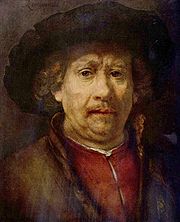
- Alexis of Russia, Tsar of Russia (1629–1676)
- Anne of Austria, Queen consort and regent of France (1601–1666)
- Gustavus Adolphus, King of Sweden (1594–1632)
- Françoise-Athénaïs, marquise de Montespan, lover of Louis XIV (1641–1707)
- Françoise d'Aubigné, Marquise de Maintenon, second wife of Louis XIV (1635–1719)
- Guru Teg Bahadur, 9th Sikh Guru (1621–1675)
- Gabriel Bethlen, Hungarian prince of Transylvania (1580–1629)
- Shivaji Bhonsle, Hindu king, 1st Maratha ruler, established Hindavi Swaraj (1630–1680)
- Queen Christina of Sweden, high profile Catholic convert, matron of arts (1626–1689)
- Charles I of England (1600–1649)
- Charles II of England (1630–1685)
- Charles II of Spain (1661–1700)
- Oliver Cromwell, Lord Protector of England, Scotland and Ireland (1599–1658)
- Richard Cromwell, Lord Protector of England, Scotland and Ireland (1626–1712)
- Elizabeth I of England (1533–1603)
- Hugh O'Neill (Aodh Mór Ó Néill), King of Tyrone and 2nd Earl of Tyrone (1550–1616), an Irish prince whose armies inflicted major defeats upon the English forces of Queen Elizabeth I during the Nine Years War in Ulster.
- Tokugawa Ieyasu, The founder and first shogun of the Tokugawa shogunate of Japan, (1543–1616)
- James I of England (1566–1625)
- James II of England (1633–1701)
- Leopold I, Holy Roman Emperor (1640–1705)
- Louis XIII of France, King of France and Navarre (1601–1643)
- Louis XIV of France, King of France and Navarre (1638–1715)
- Mary II of England (1662–1694)
- Cardinal Mazarin, French cardinal and politician of Italian origin (1602–1661)
- André Le Nôtre, French landscape architect (1613–1700)
- Peter the Great, Tsar of Russia, first Russian Emperor (1672–1725)
- Philip III of Spain, Spanish king (1578–1621)
- Philip IV of Spain, Spanish king (1605–1665)
- Popé, Tewa religious leader, led the Pueblo Revolt (ca. 1630 – ca. 1688)
- Dmitry Pozharsky, Russian prince, leader of anti-Polish uprising (1577–1642)
- Samarth Ramdas, Hindu saint (1608–1681)
- Cardinal Richelieu, French cardinal, duke, and politician (1585–1642)
- Gaspar de Guzmán, Count-Duke of Olivares politician, royal favourite (prime minister) of the Spanish king.
- Michael of Russia, Tsar of Russia (1596–1645)
- Michiel de Ruyter, Dutch admiral (1607–1676)
- Jan III Sobieski, King of Poland (1629–1696)
- Tessouat, Chief of the Algonquin
- Imre Thököly, prince of Transylvania, leader of the anti-Hapsburg uprising in Hungary (1657–1705)
- Sant Tukaram, Hindu saint (1600–1650)
- Albrecht von Wallenstein, Catholic German general in the Thirty Years' War (1583–1634)
- William III of England (1650–1702), Stadtholder of the main provinces of the Republic of the United Provinces and King of England
- Johan de Witt, Grand Pensionary of the Republic of the United Provinces – 1625–1672
Musicians and composers
- Johann Christoph Bach, Composer and great-uncle of J.S. Bach, (1642–1703)
- John Blow, English composer
- Johann Sebastian Bach, (1685–1750)
- Francesco Cavalli, Venetian opera composer
- Marc-Antoine Charpentier, French composer
- Arcangelo Corelli, Italian composer
- Nikolay Diletsky, Russian composer
- Jean-Baptiste Lully, Italian-born composer regarded as the father of French opera (1632–1687)
- Claudio Monteverdi, Italian composer of Renaissance and Baroque music (1567–1643)
- Johann Pachelbel, German composer (1653–1706)
- Henry Purcell, English composer (1659–1695)
- Alessandro Scarlatti, Italian opera composer
- Heinrich Schütz, German composer
- Monsieur de Sainte-Colombe, French composer of chamber music (c. 1640 – 1700)
- Élisabeth Jacquet de La Guerre, French harpsichordist and composer (1665–1729)
Visual artists
- Gian Lorenzo Bernini, Italian sculptor, architect (1598–1680)
- Francesco Borromini, Italian sculptor, architect (1599–1667)
- Michelangelo Merisi da Caravaggio, Italian painter (1571–1610)
- Anthony van Dyck, Flemish painter (1599–1641)
- Artemisia Gentileschi, Italian painter (1593 – c. 1656)
- Frans Hals (1580–1666)
- Jacob Jordaens, Flemish painter (1593–1678)
- Georges de La Tour, French painter (1593–1652)
- Juan Martínez Montañés, Spanish sculptor (1568–1649)
- Bartolomé Esteban Murillo, Spanish painter (1617–1682)
- Nicolas Poussin, French classical painter (1594–1665)
- José de Ribera, Lo Spagnoletto (1591–1652)
- Rembrandt van Rijn, Dutch painter (1606–1669)
- Peter Paul Rubens, Flemish painter, 1577–1640
- Jan Steen (1626–1679)
- Ruisdael (1628–1682)
- Jiang Tingxi, Chinese painter, calligrapher, encyclopedist, foreign delegate to Japan (1669–1732)
- Diego Rodríguez de Silva y Velázquez, Spanish painter (1599–1660)
- Johannes Vermeer, Dutch Painter (1632–1675)
- Francisco Zurbarán, Spanish Painter (1598–1664)
Literature
- Pedro Calderón de la Barca, Spanish dramatist (1600–1681)
- Miguel de Cervantes Saavedra, Spanish author (1574–1616)
- Pierre Corneille, French dramatist (1606–1684)
- Nicolas Boileau-Despréaux, French poet and critic (1636–1711)
- Daniel Defoe, English writer, novelist (1659 or 1661–1731)
- John Donne, English metaphysical poet (1572–1631)
- John Dryden, English poet, literary critic, translator, and playwright (1631–1700)
- Jean de La Fontaine, French poet (1621–1695)
- Luis de Góngora, Spanish poet (1561 – 1627)
- Joost van den Vondel, Dutch writer and playwright (1587–1679)
- Andreas Gryphius, German poet and dramatist (1616–1664)
- Ben Jonson, English dramatist c. 1572 – 1637)
- John Milton, English author and poet (1608–1674)
- Molière, French dramatist, actor, director (1622–1673)
- Tirso de Molina, Spanish dramatist and poet (1579–1648)
- Miyamoto Musashi, famous Samurai warrior in Japan, author of ' The Book of Five Rings,' a treatise on strategy and martial combat, poet, painter, (1584–1645)
- Samuel Pepys, English civil servant and diarist (1633–1703)
- Avvakum Petrov, Russian priest and writer (1621–1682)
- Francisco de Quevedo, Spanish writer (1580–1645)
- Jean Racine, French dramatist (1639–1699)
- William Shakespeare, English author and poet (1564–1616)
- Félix Lope de Vega, Spanish playwright and poet (1562–1635)
- John Wilmot, 2nd Earl of Rochester, English poet (1647–1680)
Educators
- Geoffrey Keating (Seathrún Céitinn), Irish historian (ca. 1569 – ca. 1644)
- Dubhaltach MacFhirbhisigh, Irish historian and genealogist (d.1671)
- Xu Xiake, Chinese geographer (1587–1641)
- Song Yingxing, Chinese encyclopedist (1587–1666)
Exploration
- Samuel De Champlain, French Explorer
- Evliya Çelebi, Ottoman Explorer
- Semyon Dezhnyov (1605–1672), Russian explorer of Siberia and the first European to sail through the Bering Strait
- Henry Hudson, (1570? – 1611), English sea explorer and navigator in the early 17th century
- Yerofey Khabarov (1603–1671), Russian entrepreneur, best known for his exploring the Amur river region
- Abel Janszoon Tasman, Dutch seafarer and explorer (1603–1659)
- Luis Váez de Torres, (c. 1565 – 1607), Portuguese or Spanish Explorer. 16th–17th century exploration of the Pacific for Spain
Science and philosophy
- Francis Bacon, English philosopher and politician (1561–1626)
- Sir Thomas Browne, English author, philosopher and scientist (1605–1682)
- Ismaël Bullialdus, French astronomer, (1605–1694)
- Abraham Darby I, English Ironmaster, Introduced the first coke-consuming blast furnace (1678–1717)
- René Descartes, French philosopher and mathematician (1596–1650)
- Pierre de Fermat, French lawyer and mathematician (1601–1665)
- Galileo Galilei, Italian natural philosopher (1564–1642)
- Pierre Gassendi, (1592–1655), French philosopher, priest, scientist, astronomer/ astrologer, and mathematician
- William Harvey, medical doctor (1578–1657)
- Thomas Hobbes, English philosopher and mathematician (1588–1679)
- Christiaan Huygens, Dutch mathematician, physicist and astronomer (1629–1695)
- Johannes Kepler, German astronomer (1571–1630)
- Antonie van Leeuwenhoek, Dutch scientist and the first person to use a microscope to view bacteria (1632–1723)
- Christopher Wren, English architect and scientist (1632–1723)
- Gottfried Leibniz, German philosopher and mathematician (1646–1716)
- John Locke, English philosopher (1632–1704)
- Marin Mersenne, (1588–1648), French theologian, philosopher, mathematician and music theorist, referred to as the father of acoustics
- Sir Isaac Newton, English physicist and mathematician (1643–1727)
- Blaise Pascal, French theologian, mathematician and physicist (1623–1662)
- Baruch Spinoza, Dutch philosopher (1632–1677)
- Sir Anthony Weldon, English courtier and politician (1583–1648)
Inventions, discoveries, introductions
List of 17th century inventions


Major changes in philosophy and science take place, often characterized as the Scientific revolution.
- Banknotes reintroduced in Europe.
- Ice cream.
- Tea and coffee become popular in Europe.
- Central Banking in France and modern Finance by Scottish economist John Law.
- Minarets, Jamé Mosque of Isfahan, Isfahan, Persia (Iran), are built.
- 1604: Supernova SN 1604 is observed in the Milky Way.
- 1605: Johannes Kepler starts investigating elliptical orbits of planets.
- 1605: Johann Carolus of Germany publishes the 'Relation', the first newspaper.
- 1608: Hans Lippershey constructs a refracting telescope, the first for which sufficient evidence exists.
- 1610: The Orion Nebula is identified by Nicolas-Claude Fabri de Peiresc of France.
- 1610: Galileo Galilei and Simon Marius observe Jupiter's Galilean moons.
- 1611: King James Bible or 'Authorized Version' first published.
- 1612: The first flintlock musket likely created for Louis XIII of France by gunsmith Marin Bourgeois.
- 1614: John Napier introduces the logarithm to simplify calculations.
- 1616: Niccolò Zucchi describes experiments with a bronze parabolic mirror trying to make a reflecting telescope.
- 1620: Cornelius Drebbel, funded by James I of England, builds the first 'submarine' made of wood and greased leather.
- 1623: The first English dictionary, 'English Dictionarie' is published by Henry Cockeram, listing difficult words with definitions.
- 1628: William Harvey publishes and elucidates his earlier discovery of the circulatory system.
- 1637: Dutch Bible published.
- 1637: Teatro San Cassiano, the first public opera house, opened in Venice.
- 1637: Pierre de Fermat formulates his so-called Last Theorem, unsolved until 1995.
- 1637: Although Chinese naval mines were earlier described in the 14th century Huolongjing, the Tian Gong Kai Wu book of Ming Dynasty scholar Song Yingxing describes naval mines wrapped in a lacquer bag and ignited by an ambusher pulling a rip cord on the nearby shore that triggers a steel-wheel flint mechanism.
- 1642: Blaise Pascal invents the mechanical calculator called Pascal's calculator.
- 1642: Mezzotint engraving introduces grey tones to printed images.
- 1643: Evangelista Torricelli of Italy invents the mercury barometer.
- 1645: Giacomo Torelli of Venice, Italy invents the first rotating stage.
- 1651: Giovanni Riccioli renames the Lunar mare.
- 1656: Christiaan Huygens describes the true shape of the rings of Saturn.
- 1657: Christiaan Huygens develops the first functional pendulum clock based on the learnings of Galileo Galilei.
- 1659: Christiaan Huygens first to observe surface details of Mars.
- 1662: Christopher Merret presents first paper on the production of sparkling wine.
- 1663: James Gregory publishes designs for a reflecting telescope.
- 1669: The first known operational reflecting telescope is built by Isaac Newton.
- 1676: Antoni van Leeuwenhoek discovers Bacteria.
- 1676: First measurement of the speed of light.
- 1679: Binary system developed by Gottfried Wilhelm Leibniz.
- 1684: Calculus independently developed by both Gottfried Wilhelm Leibniz and Sir Isaac Newton and used to formulate classical mechanics.
Decades and years
|
|||||||||||||||||||||||||||||||||||||||||||||||||||||||||||||||||||||||||||||||||||||||||||||||||||||||||||||||||||||||||||||||||||||||||
|
||||||||||||||||||||||||||||||||||||||||||||||||||||||||||||||||||||||||||||||||||||||||||||||||||||||||||||||||||||||||||||||

